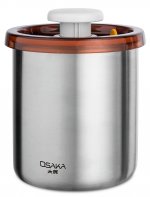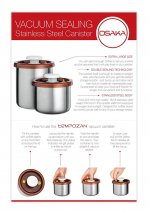Missjune75
New member
I just received two pounds of delicious (holy cow) Bolivian coffee beans from fellow coffee forum roaster Musicphan Encore Coffee Company. That usually will last me two weeks.
However, my friends just surprised me with 12 oz of my favorite NYC roaster/cafe Gimmee Coffee Kenya beans. How do I keep both fresh. I don't want to freeze them and I have a few more canisters to keep them in but not sure what my best option is besides stay up for the next two weeks drinking delicious coffee. The Kenya coffee is still in its bag unopened. The Bolivian is in a canister.
Any suggestions would be most welcome.
Btw thanks Ensoluna for the Contigo suggestion. I love that thermos and fill the whole 20 oz container to work with me everyday. It was well worth the $10.
However, my friends just surprised me with 12 oz of my favorite NYC roaster/cafe Gimmee Coffee Kenya beans. How do I keep both fresh. I don't want to freeze them and I have a few more canisters to keep them in but not sure what my best option is besides stay up for the next two weeks drinking delicious coffee. The Kenya coffee is still in its bag unopened. The Bolivian is in a canister.
Any suggestions would be most welcome.
Btw thanks Ensoluna for the Contigo suggestion. I love that thermos and fill the whole 20 oz container to work with me everyday. It was well worth the $10.


